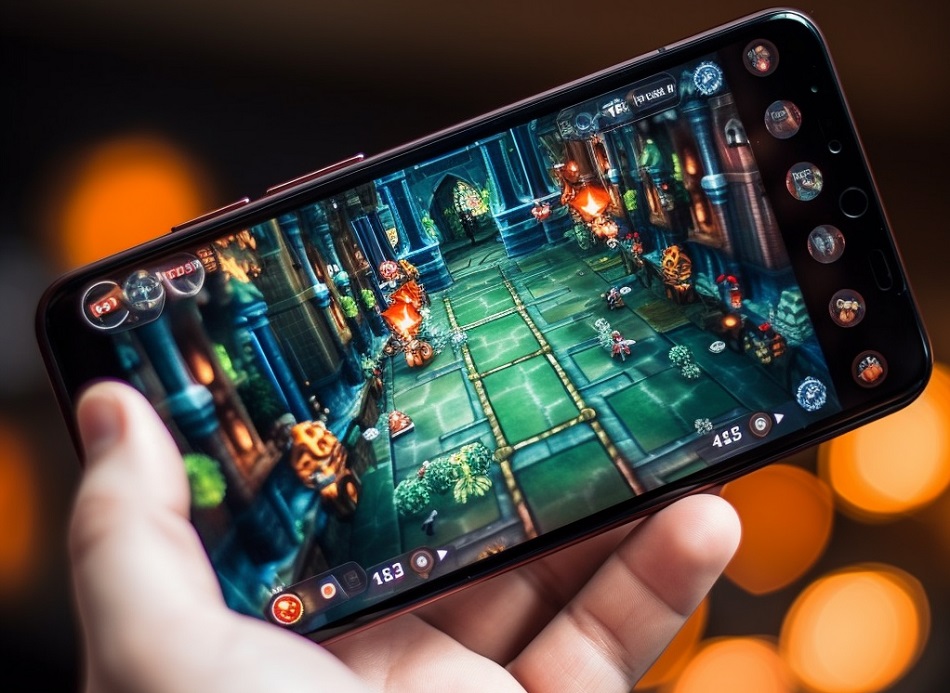The gaming industry has undergone significant transformation since the dawn of the first video game. From simple pixelated arcade games to graphically rich 3D environments, the evolution has been nothing short of extraordinary. One segment of the industry that has seen particularly robust growth in recent years is mobile gaming. Here’s a deep dive into why mobile is being touted as the future of the gaming industry.

The Rise of Mobile Gaming
The advent of smartphones and advancements in mobile technology has dramatically revolutionized the gaming industry. Over the last decade, mobile gaming has grown from being a niche market to a dominant player in the gaming ecosystem. This can be attributed to a confluence of factors such as the ubiquity of smartphones, improved internet connectivity, and the rise of digital distribution platforms.
Ubiquity of Smartphones
Smartphones have become ubiquitous worldwide. As of 2021, there were approximately 3.8 billion smartphone users globally, and the number is projected to grow steadily. This has created a vast market for mobile gaming, making it accessible to a diverse range of age groups and demographics. The convenience of playing games anywhere and anytime on a device that almost everyone owns has greatly contributed to the popularity of mobile gaming.
Improved Internet Connectivity
The proliferation of high-speed internet and the rollout of 5G networks worldwide have significantly improved the mobile gaming experience. Faster internet speeds have enabled real-time multiplayer gaming on mobile devices, opened up opportunities for cloud gaming, and made it easier for users to download and update games.
Digital Distribution Platforms
Digital distribution platforms such as Google Play Store and Apple App Store have democratized game publishing, allowing even small developers to reach a global audience. These platforms have lowered the barriers to entry in the gaming industry and led to an explosion of innovative games across a wide variety of genres.
Advancements in Mobile Technology
Mobile devices have seen dramatic improvements in processing power, graphics capabilities, and memory, making them capable of running high-quality games that were previously only possible on PCs or consoles. Developers are now creating mobile games with complex mechanics and stunning visuals that can rival traditional console games. The development of technologies such as augmented reality (AR) and virtual reality (VR) for mobile devices is also expected to drive the growth of mobile gaming further.
The Economic Impact of Mobile Gaming
Mobile gaming has become a major economic force within the gaming industry. According to a report by Newzoo, mobile games generated $77.2 billion in revenue in 2020, accounting for almost half of the global gaming market. The market research firm also predicts that by 2023, the mobile gaming market will reach $106.4 billion.
The Social Aspect of Mobile Gaming
Mobile gaming has also changed the social dynamics of gaming. Many mobile games are built around social interaction, whether it’s collaborating with others in multiplayer games, competing against friends in leaderboards, or sharing game-related content on social media. This social aspect of mobile gaming helps to foster a sense of community and keeps players engaged.
The Role of Casual Games

Casual games – those that are easy to play and usually require less time commitment than more complex games – have found a natural home on mobile devices. These games, such as Candy Crush Saga and Among Us, appeal to a broad audience, including people who might not consider themselves gamers. The success of casual games has been a major driver of mobile gaming growth.
Challenges and Opportunities in Mobile Gaming
Despite the potential and significant growth of mobile gaming, it is not without its challenges. The mobile gaming industry is highly competitive, with countless games vying for user attention. Moreover, the free-to-play model that dominates the mobile gaming landscape means that monetization can be a challenge. Developers must create compelling games that not only attract players but also encourage them to make in-app purchases or watch ads.
Despite these challenges, the mobile gaming industry also presents immense opportunities. As new technologies such as cloud gaming, augmented reality (AR), and virtual reality (VR) become more mainstream, they will open up new possibilities for game development. The introduction of 5G also has the potential to significantly enhance multiplayer and streaming capabilities, changing the way games are played and experienced.
Cloud Gaming and Mobile
Cloud gaming, in particular, represents a significant opportunity for the mobile gaming industry. By running games on powerful servers and streaming them to devices, cloud gaming can deliver console-quality games to mobile devices, bypassing the hardware limitations of these devices. Services such as Google’s Stadia and Microsoft’s Xbox Cloud Gaming are leading the way in this space.
Augmented Reality (AR) and Virtual Reality (VR) in Mobile Gaming
AR and VR also offer exciting new ways to play games. Pokémon Go’s use of AR to blend the real world with the game world was a global sensation and showed the potential of AR in mobile gaming. Meanwhile, while VR is still largely associated with PC and console gaming, standalone VR headsets and mobile VR solutions are making this immersive technology more accessible.
The Impact of 5G on Mobile Gaming
The rollout of 5G networks around the world will have a profound impact on mobile gaming. 5G offers significantly faster data speeds and lower latency than 4G networks, which will greatly improve the performance of multiplayer games and cloud gaming services. It could also enable more complex and resource-intensive games to be played on mobile devices.
Inclusion and Diversity in Mobile Gaming
Finally, mobile gaming has the potential to be a force for inclusion and diversity in the industry. With its wide reach, mobile gaming can bring games to a diverse global audience, including those who have been traditionally underrepresented in gaming. Mobile games also cover a wide range of genres and styles, appealing to a diverse set of interests and tastes.
Looking Ahead
The future of the gaming industry is inextricably linked with mobile. As technology continues to advance and the world becomes increasingly connected, the opportunities for growth and innovation in mobile gaming are boundless. Developers, publishers, and gamers alike have much to look forward to as we move into this exciting future. While the landscape will continue to evolve and present new challenges, the potential of mobile gaming is undeniable. Mobile is not just a part of the gaming industry; it is the future of gaming.
Innovations in Game Design and Monetization
Another area that’s proving crucial in mobile gaming’s ascendancy is the constant innovation in game design and monetization strategies. The mobile gaming platform is fertile ground for trying new things, and many of these innovations have driven the industry’s growth.
Hyper-Casual and Instant Games
One of the most significant trends in mobile gaming is the rise of hyper-casual and instant games. These are simple, easy-to-play games that often rely on one-touch mechanics. They are quick to download, easy to understand, and can be played in short bursts, making them perfect for the on-the-go nature of mobile gaming. Examples include titles like Subway Surfers, Helix Jump, and Crossy Road.
In addition, platforms like Facebook Instant Games are pushing the boundaries even further by offering games that can be played instantly, with no downloads required, straight from the social media app. This further lowers the barriers to entry and makes gaming even more accessible.
Mobile eSports
Mobile eSports is another emerging trend that’s shaping the future of the gaming industry. While eSports has traditionally been dominated by PC and console games, the mobile platform is quickly catching up. Games like PUBG Mobile, Mobile Legends: Bang Bang, and Arena of Valor have massive player bases and have successfully established professional eSports leagues.
The growth of mobile eSports opens up new avenues for monetization, such as sponsorships, advertising, and in-game purchases. It also creates a more competitive environment that can drive player engagement and retention.
Gacha and Battle Pass Monetization
When it comes to monetization, the mobile gaming industry has also been at the forefront of innovation. The gacha system, which originated from Japanese mobile games, is now widely used in mobile games worldwide. This system, where players spend in-game currency to receive random virtual items, has proven to be an effective way to monetize free-to-play games.
Similarly, the battle pass system, popularized by Fortnite, is another innovative monetization strategy that’s been widely adopted in the mobile gaming industry. This system provides players with a series of in-game challenges and rewards them with exclusive items as they complete these challenges.
Integration with Other Media
Finally, the mobile gaming industry has been successful in integrating games with other media. Many popular mobile games are based on movies, TV shows, or other established franchises, such as Marvel Contest of Champions or Star Wars: Galaxy of Heroes. This cross-media synergy not only attracts fans of these franchises to the games but also exposes the games to a wider audience.
Conclusion: A Mobile-First Future
As we look forward, it’s clear that mobile is leading the way in the gaming industry. With its unparalleled accessibility, continuous technological advancements, innovative game design, and successful monetization strategies, mobile gaming has a bright and exciting future.
However, as the mobile gaming industry continues to grow and evolve, it’s crucial to keep an eye on the challenges that come with it, such as the saturation of the market, the need for fair monetization, and the importance of creating engaging, high-quality games. Yet, with every challenge comes new opportunities for innovation and growth.
Indeed, the future of gaming is mobile, and it is a future filled with limitless potential. The game developers, designers, and innovators who will thrive in this landscape are those who embrace the unique possibilities of the mobile platform and who are ready to shape the future of gaming.
